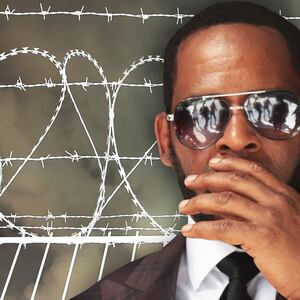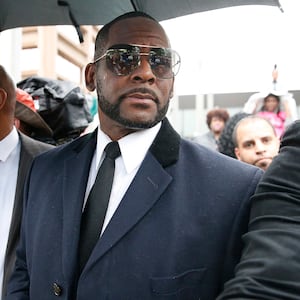R. Kelly choked a teen girl until she passed out and then spit on her when she regained consciousness, according to the first witness testimony at the singer’s federal racketeering trial on Wednesday.
After several legal delays—and snags imposed by a global pandemic—prosecutors laid out their extensive case against Robert Sylvester Kelly in Brooklyn federal court. They argued the Grammy-winning singer and producer was, for decades, at the helm of a criminal enterprise funded in part by his legit music ventures and devoted to horrific sexual deviancy.
“As insurance and a way to make sure these women wouldn’t talk, [Kelly] created and collected collateral. He made them create embarrassing videos and false letters,” said Assistant United States Attorney Maria Cruz Melendez. “He kept it in his back pocket in case anyone tried to accuse him of anything.”
Kelly, 54, is charged in New York with an array of federal charges, including racketeering based on sexual exploitation of children, kidnapping, and forced labor. He is also charged with violations of the Mann Act, which bars the transport of people across state lines for sex.
The charges stem from alleged abuse against at least six women and girls, four of whom were allegedly minors when Kelly first slept with them. At least two also contracted herpes from the singer after he knowingly exposed them to the disease, according to prosecutors, who said Wednesday that most of the women were expected to testify in the coming weeks.
“This case is about a predator,” Cruz Melendez said. “A man for decades who used his fame, his popularity, and a network of people at his disposal to target and groom girls, boys, and women for his own sexual gratification.”
“Using his money, clout, and public persona to hide his crimes in plain sight,” she added, while Kelly, dressed in a gray suit and glasses, was taking notes at the defense table.
The first accuser to testify, Jerhonda Pace, described to jurors a six-month relationship she had with Kelly when she was 16 years old. The relationship, which mostly consisted of sexual encounters at his Olympia Fields mansion, ended in January 2010 after the pair got into an argument—and Kelly got so angry he attacked her, she said.
“He slapped me and he choked me until I passed out,” Pace said on Wednesday, adding that when she regained consciousness, Kelly “spit in my face and told me to put my head down in shame.”
She did as she was told, Pace told jurors.
Afterward, she continued, Kelly forced Pace to perform oral sex—and she cleaned herself up with a blue Aeropostale t-shirt that she later turned over to authorities. Prosecutors showed the t-shirt in court on Wednesday, stating it had Kelly’s DNA on it.
Months earlier, she said, she first met Kelly in 2008 outside a Chicago courtroom—where he was on trial for child pornography charges.
“I said I was a fan and he said, ‘Thank you for your support,’ and I told him, ‘My birthday was coming up,’ and he said, ‘happy early birthday,’” Pace, who is now 28 years old and nine months pregnant, said Wednesday.
Initially lying about her age, Pace said, she first went to Kelly’s house in May 2009 after one of his tour managers invited the teenager and her friend to a party. There, Pace said, she and Kelly exchanged numbers.
A few days later, Pace said, Kelly invited her back to his home—telling her to bring a bathing suit because he had an indoor pool. When she arrived, she changed into her suit and waited for the singer while he was finishing up a haircut upstairs.
When he came down, Pace said, Kelly sat in a lounge chair “and told me to walk back and forth and take off a piece of clothing every time I walked back.”
“I did as I was told,” she said.
Pace said that soon after, she and Kelly started kissing and eventually the singer performed oral sex on her. Afterward, Pace said, she felt “uncomfortable and told him I was 16 and showed him my state ID.” She said Kelly responded by asking her “‘what is that supposed to mean,’ and then he told me to tell people that I was 19 and act like I was 21.”
“[Kelly] told her he wanted to train her, to teach her how to give oral sex,” Cruz Melendez said about their first meeting.
Pace also said Wednesday that during the first sexual encounter, she told Kelly she was a virgin—and one of the singer’s associates later gave her $50 in an envelope to “get home.”
Prosecutors said that soon after the meeting, the relationship became controlling and that the teen was forced to adhere to strict rules and provide collateral., culminating in the alleged choking incident.
Kelly “didn’t want me in contact with anyone,” Pace said when describing how the singer took her phone. “He only wanted me walking to him.”
Kelly has pleaded not guilty to all charges against him. His defense team plans to argue to jurors that the accusers had consensual relationships with the singer—and that the ones who testify are liars who “have an agenda.”
“Don’t assume everyone is telling the truth,” defense attorney Nicole Blank Becker said during her opening statements on Wednesday. She added that prosecutors and the witnesses they plan to put on the stand “will attempt to put a square peg into a round hole.”
During Becker’s marathon opener, Kelly appeared to nod off for at least five minutes.
The Brooklyn trial is just the first step in a series of potential criminal reckonings for Kelly, who is also facing federal and state charges in Chicago and Minnesota.
In a bare courtroom only occupied by 12 jurors—no press, no public—prosecutors systematically argued that Kelly’s success allowed him to lure, imprison, and abuse.
To do so, Kelly created a criminal enterprise made up of bodyguards, drivers, assistants, and other employees—and ruled it similarly to how a mob boss would, prosecutors said. They argued the team would help him lure young women who were at his concerts, often helping them backstage after his performance and making sure the star had their contact information.
“He created and relied on his inner circle to facilitate his crimes,” Cruz Melendez said. “Sometimes, they did these things out of fear of him.”
The enterprise would also help Kelly maintain communication—and ultimately, prosecutors say, undue control— over these women in several ways, including facilitating their travel and lodging to see the singer. Prosecutors allege that Kelly and others “knowing and intentionally” transported at least two underage girls—identified in court papers at Jane Doe 5 and Jane Doe 6—for the purpose of “unlawful sexual intercourse.” Kelly also allegedly gave Jane Doe 6 herpes.
The Kelly loyalists also took extraordinary steps “to ensure that the women and girls did not interact with others Kelly planned to see,” and made sure they followed all of the singer’s depraved rules, prosecutors said.
Among the alleged rules: The women and girls were to call Kelly “Daddy,” they were not to do anything without his permission, they were required to wear baggy clothing when out of Kelly’s presence, and they were directed to keep their head down “so they would not look at other men.”
“His rules, these punishments, they kept his victims compliant,” Cruz Melendez said. “He used every trick.”
Becker slammed the allegation about Kelly imposing harsh rules, saying at one point that the “word ‘Daddy’ has now become equivalent to the worst word you could ever think of.”
Among the allegations against Kelly is that he bribed an Illinois government employee with $500 to obtain a fake ID for “Princess of R&B” Aaliyah so he could marry her in 1994 after finding out she might be pregnant. At the time, Aaliyah—who died in a 2001 plane crash at 22—was just 15 years old.
The marriage certificate, however, stated that she was three years older, and thus of legal age to marry the then-27-year-old “Bump N’ Grind” artist.
Kelly “decided he needed to marry Aaliyah... so she would not talk,” Cruz Melendez said, adding that the pair were wed inside an Illinois hotel suite near the airport. After the ceremony, the prosecutor said, Kelly flew out to continue his music tour.
In the indictment, prosecutors refer to Aaliyah as “Jane Doe #1” since she was a minor at the time of the alleged offense, but she was identified in open court on Wednesday.
Prosecutors also argue that Kelly engaged in the “sexual exploitation of a child,” identified in court papers as Jane Doe 2, by coercing her to participate in “sexually explicit conduct for the purpose of producing one or more visual depictions of such conduct,” between May and October 1999. The indictment also accuses Kelly of kidnapping a woman, identified in court papers as Jane Doe 3, between 2003 and 2004 and holding her “against her will.”
Between May 2009 and January 2010, prosecutors also allege Kelly transported Jane Doe 4—who was identified on Wednesday as Pace—when she was a minor “for the purpose of producing one or more visual depictions of such conduct.”
On top of acts laid out in the indictment, prosecutors also told jurors they will hear evidence of other sexual misconduct for which Kelly is not facing charges. Among those claims is a 2006 sexual encounter with a 17-year-old boy Kelly allegedly met at a Chicago McDonalds.
Cruz Melendez told jurors that several pieces of evidence will also be present during the trial, including texts between Kelly and his victims, false collateral many of these women were forced to provide, medical documentation to prove the singer’s herpes diagnosis, and videos and audio he made of himself or others.
“This evidence will be tough to watch,” Cruz Melendez said.
Kelly’s defense team took an aggressive stance even as he seemed uninterested, arguing the singer had been long marred with disturbing allegations from women who were at one point all fans of his music.
In a lengthy opening statement, in which she frequently called the accusers “girls” and was stopped multiple times by the judge for her statements, Becker insisted the government’s case was riddled with untruths. She added that all her client’s accusers had “both a personal and financial bias to be in a relationship with Mr. Kelly.”
“Some even enjoyed the notoriety of being able to tell their family they were with a superstar,” the defense lawyer said.
Becker insisted that the women “were not recruited” and all consented to be in a relationship. She added that when these “consensual relationships with adults” ended, the women became “angry, resentful, and even spiteful” with Kelly.
In court documents, the singer’s defense team has argued the prosecution is unfairly charging Kelly with crimes that fall outside the statute of limitations, that the feds lack evidence, and that they solely rely on witness testimony of disgruntled women.
In a last-ditch memo filed Monday night to dismiss the nine-count indictment against Kelly, his defense lawyers also argued that herpes does not fall under a public health law’s definition of an “acute, bacterial venereal disease” and therefore should not be part of the indictment.
The memo adds that if HIV is not considered a serious injury because “it no longer poses a grave risk of death”—and thus its transmission is not criminally liable— then “herpes should not be judge [sic] differently.”







